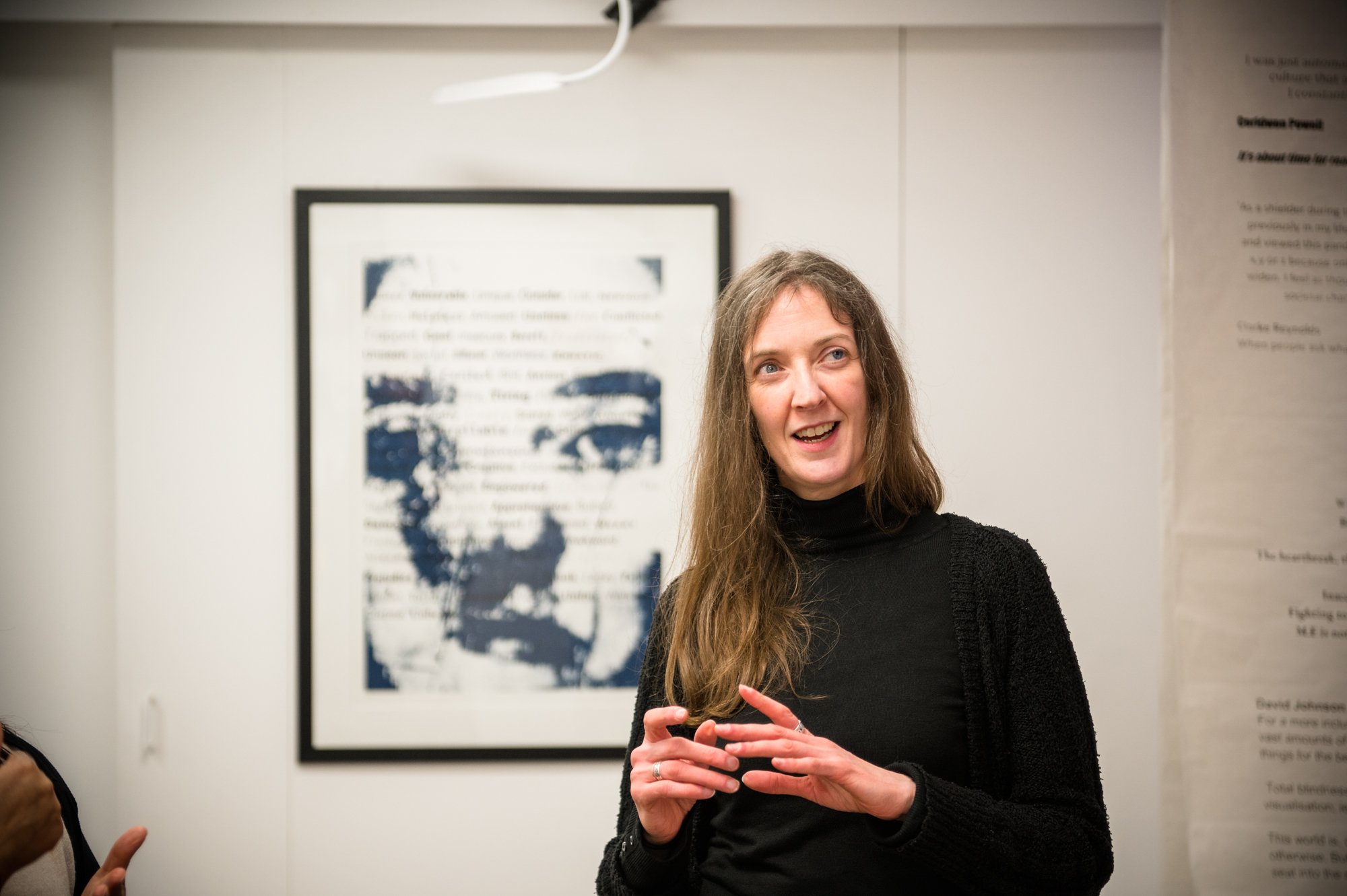9 Words Podcasts: Transience
Fae Kilburn talks at exhibition launch - Image by Dee Patel
TRANSIENCE – Fae Kilburn
In this podcast we talk to Fine Artist and Arts Facilitator Fae Kilburn.
“I learnt so much from Fae about her changing sight loss and being visually impaired. I don’t think I’d considered how it could be a beautiful experience.” Bobby Tiwana
Fae Kilburn Artwork
Fae Kilburn Artwork
Extracts from the podcast
“When I was diagnosed with epilepsy I was 6. …school wanted to exclude me. So, from a very young age I went from being included like everybody else to schools not wanting me.”
“I just remember looking out of a small window at everyone else having fun in a playground and me not being allowed. And my parents were told that they should be grateful that I was even allowed in a school and that somebody like me should be in an asylum.”
“In my final year of secondary school I got this, an amazing art teacher and he was like ‘you should go to university’, and that was the first time in my life, anyone apart from my family had ever believed in me. It was just… the most… amazing …I know how it feels when someone does believe in you.”
“Sometimes it's layers of translucent colours… I can literally see through the person who’s sitting in front of me to the object behind because it's just literally layers, everything's translucent and I'm quite captivated by that because I end up just staring at everything and going ‘this is quite mind-blowing and beautiful at the same time’.”
“As a printmaker the first thing you learn is the sound of rolling out ink, there’s a right sound and a wrong sound. If it sounds like tar then you’ve definitely put out too much, there should be a really beautiful sound when you're rolling out your ink.”
“Disabled people have only had rights for 25 years. If you think that everyone says that women have only had rights for 100 years and that’s so recent. Nobody seems that shocked that disabled people would have only had rights for 25 years, no one ever mentions that really.”
“I find myself watching people walk by but only the middle of their bodies will be completely disappeared, and I'll just know that maybe the head will be there… It's quite an odd experience but quite beautiful …I live in a very soft-focused world as well so there's no hard edges and …beautiful soft tones.”
“In 2020 I interviewed a lot of the major galleries on why they're not exhibiting disability art and some of them said that it wasn't relevant to their collections, ‘disabled artists don't make good quality work’.”
“It can be very unsettling because there's no contrast when I'm trying to walk on surfaces. So, steps can be really challenging, generally the bottom step …if I’m in nature and I don't know what I'm standing on, it can go very quickly from being a very pleasant experience to experiencing apprehension.”
“I think when you are young, or at any age you take things for granted until you don't have them anymore and then you like ‘oh wow!’ But I also think humans are amazing at adapting.”
“The reason I've used Japanese paper is because is, it appears to be very delicate and fragile but it's actually incredibly strong and that is how disabled people are so often perceived. That is the reason for using those materials, it’s how I've been perceived all my entire life, but I feel I'm strong and resilient and I never give up.”
Download the transcript of the podcast here.
Transience Credits
Artist Fae Kilburn
Presented and produced by Bobby Tiwana
Sound design, engineering and editing by Duncan Grimley
Commissioned by Creative Black Country
Funded by Arts Council England
Supported by Wolverhampton Arts & Culture and Paycare.
Fae Kilburn Exhibition Launch - Image by Dee Patel
Fae Kilburn Exhibition Launch - Image by Dee Patel
Want to find out more about Fae’s work?
You can see a gallery of images from Fae’s Perspectives launch event for Offsite9 here.
You can read an interview with Fae here.





